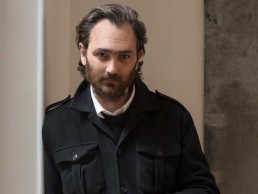
Maison&Objet Designer of the Year named

(France) – Maison&Objet names its Designer of the Year, Franklin Azzi.
At each edition, Maison&Objet names a Designer of the Year, celebrating the work of the most outstanding talents on the
international design and decoration scene. Having been unable to present his installation on receiving the accolade in September 2020, Franklin Azzi will now take centre stage at the March 2022 edition with Retro Futur, an immersive exploration of his creative process.
Working out of his Parisian agency created in 2006, Azzi develops a cross-disciplinary approach that draws on a potpourri of perspectives and disciplines. By relentlessly sparking a dialogue between architecture, interior design, design and modern art with the backing of his dedicated endowment fund, he hones a talent for design and creation that embraces all scales and all spaces.
From the kind of urban microarchitecture embodied by the Eiffel Kiosque and its prefabricated structure to towers in Dubai and
Paris, not forgetting the refurbishment of existing structures such as the Alstom warehouses in Nantes, his work is underpinned by a quest for sustainability tailored to meet users’ needs. Turning his back on formal style, Azzi develops architecture that is both minimalist in its aesthetic and maximalist in its multi-faceted functionality and environmental quality, resolutely advocating a return to ‘common sense’. He walks firmly in the footsteps of philosopher and urban planner Paul Virilio, the exploratory thinker and creator of whom he was once a student.
Franklin Azzi’s agency boasts more than sixty talented members of staff, and by combining their expertise with a research and innovation laboratory, he asserts a deep-rooted desire to blaze a new trail. Closely focusing on people and their environment, he queries, examines, analyses and explores contexts, production methods and materials prior to breathing life into each space. The agency’s creative process begins by focusing on the flexible use of a space and transforming what is already there with a view to tackling the modern-day goal of creating future-proof cities. As well as rising to the challenge of being of high environmental quality, the Daumesnil building, which he is currently developing in a brand-new neighbourhood in Paris’s 12th arrondissement, flies the flag for flexibility, having been specifically designed so that its offices can be turned into residential spaces.
Azzi’s commitment as a designer-creator infiltrates every aspect of his work, from the largest scale projects to the tiniest manufacturing details, permeating public and private commissions alike, both in France and overseas. He breathes new life into built heritage, invents the living and working spaces of the future (The Bureau, Be In for LVMH), designs urban environments that sit sympathetically in their surroundings (Beaupassage for Emerige), and devises dismantlable and removable structures (the pavilion on the roof of the Galeries Lafayette department store).
Emblematic in its capacity to create and innovate through re -use, the new Montparnasse Tower, planned for 2024, seeks to summarise its vision of the vertical city, low in energy use, open and resilient. Convinced of the strength of collective intelligence to meet the challenges of our time, Franklin Azzi has been working on this major project since 2017 with Nouvelle AOM – a collective that he initiated for the international Demain Montparnasse competition – teaming up with practices Chartier Dalix Architectes and Hardel Le Bihan Architectes. All these spaces shape a brand-new landscape of possibilities, serving up sustainable and contemporary solutions designed to benefit their users.
Retro Futur is an artistic installation that explores the creative processes of the future using tools from the past, echoing the way in which Azzi approaches his work as an architect. The immersive Retro Futur installation stages the architect’s day-to-day activities via a digital, modular and pared-back table in black lacquered metal: it diffuses, across a series of screens, a selection of basic and traditional tools specific to the trade (set square, rotring pen, tracing paper, light table, etc.) as well as the various items required each day when developing a project: architectural models, materials, sketches, etc.
Static and moving images appear in succession, showcasing the manual techniques the architect employs in conjunction with his latest creations. Strapping made from strips of up-cycled industrial felt separates the object from the rest of the lounge. As Joseph Beuys (1921-1986) was keen to convey, felt is an outstanding natural material that can help retain heat, a source of energy that served as a veritable creative driver for the German artist’s work.
The space itself is entirely upholstered with felt, including the ceiling, creating an acoustic bubble that fosters concentration. The slatted curtain, meanwhile, invites visitors to enter and exit the installation at will. The durable and natural felt, which is manufactured in France by Le Feutre, imbues the space with an intimate, calming vibe. The installation resolutely embraces the retro futurism trend that is sweeping through the creative arts, and is one of the sources of inspiration underpinning the agency’s overall approach. It is characterised by a fusion of imagery that sees progress and science-fiction pictured in the past with a view to seeing all futuristic aspects of the present become retro-futuristic over time.



